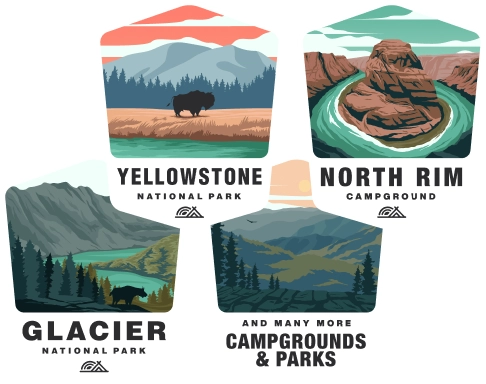Camping at Carter Lake
Carter Lake Overview
Carter Lake is a popular recreation area located in Colorado, United States, that offers a wide range of outdoor activities, including camping, fishing, boating, swimming, and hiking. Managed by Larimer County Parks and Open Lands, it's nestled in the foothills of the Rocky Mountains, west of Loveland and southwest of Fort Collins.
Camping Information
Reservations: Most campgrounds around Carter Lake require reservations, which can be made through the Larimer County website or by calling the reservation line. It is highly advisable to book your spot well in advance, especially for peak season weekends and holidays.
Campgrounds: Carter Lake has several campgrounds to choose from, including:
- Eagle Campground: Offers electric hookups, close to the marina.
- South Shore Campground: Primarily tent camping, with some sites offering electric hookups.
- Big Thompson Campground: Small campground, typically quieter, with basic facilities.
Facilities: The campgrounds typically offer amenities such as:
- Potable water
- Flush toilets and vault restrooms
- Fire pits and picnic tables
- Dump stations
- Playground areas
Fire Restrictions: Always check the current fire restrictions before starting a campfire. Restrictions can change based on weather conditions and the risk of wildfire.
Campground Rules:
- Quiet Hours: Usually enforced from 10 PM to 6 AM.
- Pets: Pets must be kept on a leash and under control at all times.
- Wildlife: Feeding wildlife is prohibited, and all food must be properly stored.
- Alcohol: May be restricted or prohibited in certain areas.
Activities
Boating: Carter Lake is a haven for boaters, and you will need to ensure that your vessel is properly inspected for aquatic invasive species before launching.
Fishing: The lake is stocked with various species such as trout, walleye, and bass. A Colorado fishing license is required.
Hiking: There are multiple trails around the lake providing scenic views and wildlife watching opportunities.
Swimming: There are designated swimming areas, but it’s important to note that there are no lifeguards on duty.
Wildlife and Environment
Conservation: As a natural area, visitors are expected to follow Leave No Trace principles to help preserve the environment.
Wildlife Encounters: Be aware of local wildlife such as bears and mountain lions. Proper food storage and disposal are critical to avoid attracting animals to campsites.
Weather and Safety
Conditions: Weather can change rapidly in the Rocky Mountains. Campers should prepare for a range of conditions and pack layers of clothing.
Altitude: Carter Lake sits at a higher altitude, so visitors from lower elevations may need to acclimate to avoid altitude sickness.
Contact and Emergency Information
Always have the contact information for the campground, local emergency services, and ranger stations handy. Carry a map and know the physical address of the campground in case of an emergency.
Accessibility
Check for any available accessible facilities if you or anyone in your group has special needs. Some campgrounds may offer adapted camping solutions or amenities.
This overview provides a general idea of what campers can expect when visiting Carter Lake, but it's essential to check the most current information and regulations before heading out to ensure a safe and enjoyable trip.
